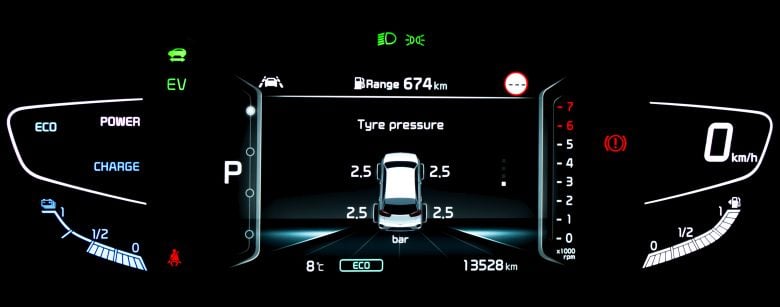
Hybrid or Electric Car: Which Should You Buy?
- Vehicle Maintenance
- PEAK
- January 23, 2025
Can't decide between an electric or hybrid car? Follow this guide to help understand the pros and cons of each!
Electric vehicles (EVs) and hybrids that use both gas and electricity continue to grow in popularity. The International Energy Agency (IEA) projects a 20% year-over-year increase in EV sales in the United States in 2024, even after a record-shattering year in 2023.
Similar trends define the hybrid market. According to Barron's, year-over-year hybrid sales were up 93% in 2021, 63% in 2022, and 56% in 2023. Those are stunning numbers, even if they've recently tailed off a bit.
EVs and hybrids are obviously connecting with buyers in a big way. If you're thinking about hopping on the bandwagon but you aren't sure whether fully electric or hybrid cars are a better option, this guide can help you figure it out.


Understand the differences between EVs and hybrids
Fully electric vehicles and hybrids both offer ways to reduce your fossil fuel consumption and carbon emissions. They also help you cut or eliminate gas costs.
Hybrids come in two main varieties: traditional and plug-in. Both draw on both gasoline and electricity for power, but in different ways.
Here's a breakdown of the key differences between EVs and traditional and plug-in hybrids:
- EVs draw exclusively on lithium-ion batteries to power a fully electric motor. These motors are far more efficient than combustion engines at converting energy input into propulsion. About 80% of the energy delivered to an EV motor propels the car forward, compared to around 25% for gas-powered engines.
- Traditional hybrids use both gasoline and electricity for energy, which work together at all times to power the vehicle. While traditional hybrids consume gas, a 2019 study found that they use up to 49% less than cars with internal combustion engines (ICEs).
- Plug-in hybrids have rechargeable batteries, which you power up by plugging in just as you would with a regular EV. The vehicle will use only electricity as long as it can, then switch to a combination of gas and electricity when the battery gets low.
Key factors to decide between a fully electric car or hybrid car
There isn't a right or wrong answer when it comes to fully electric or hybrid cars. Instead, you should evaluate each in the context of your finances and personal preferences.
Consider:
Purchase price
With respect to retail prices, hybrids have a clear advantage over fully electric vehicles — but only when they're brand-new.
A 2024 Barron's analysis of Cars.com data found that hybrids, including both traditional and plug-in hybrids, cost an average of $14,884 less than full EVs. Those savings represent 23.3% of the average EV's purchase price.
Meanwhile, the resale values of used EVs have dropped sharply in 2024, making a pre-owned vehicle an appealing option for cost-conscious buyers. In June 2024, the average price of a used EV fell to $28,767, marking a drop of nearly 30% over 2023.
Used hybrids have highly variable resale values that depend a lot on year, make, and model. The typical used hybrid costs more than a comparable gas-only vehicle, but the price spread is usually only a few thousand dollars.
With the average price of a used EV now falling below the average price of a used gas-only vehicle, fully electric pre-owned vehicles likely have a cost advantage over pre-owned hybrids.
Ownership costs
Vehicle ownership costs cover three main factors:
- Insurance
- Energy (i.e. gas and electricity)
- Maintenance and repairs
Let's break it down:
Insurance
A 2024 Motley Fool analysis found that EVs and hybrids carry similar insurance costs, which average about 7% to 11% more than traditional ICE vehicles. All things equal, your insurance costs are probably a wash no matter which way you go.
Energy
Various sources have different takes on the average annual cost of supplying an EV with electricity. This is likely due to the variable electricity costs and pricing policies in local markets, but one widely cited figure reported in 2024 by the National Resources Defence Council (NRDC) placed average EV charging costs at $485 per year.
Hard numbers are also tricky and variable with respect to plug-in hybrids. A 2024 Consumer Reports analysis concluded that plug-in hybrids usually lead to gasoline cost savings over ICE vehicles, as long as you're vigilant about plugging them in. Notably, plug-in hybrids also give you the flexibility to choose whichever energy source is cheaper at the moment.
Compared to the NRDC's numbers for EVs, traditional hybrids carry higher operating costs. In 2023, J.D. Power found that the typical U.S. driver spends $150-$200 on gas per month, or $175 if you split the difference. If you max out your hybrid's monthly gas savings at 49% over an ICE vehicle, you're still looking at about $90 per month or $1,080 per year in fuel costs.
Maintenance and repairs
Fully electric vehicles have fewer working parts, so they're less prone to mechanical failures than vehicles that use gasoline. A 2024 CNBC analysis found that EVs have a clear advantage over both traditional and plug-in hybrids when it comes to maintenance and repair costs.
In 2022, Forbes reported the average cost of an EV's scheduled maintenance at $0.06 per mile compared to $0.10 for ICE models. According to Cars.com, scheduled maintenance costs for hybrids are pretty close to even with gas-powered vehicles.


Performance
Many EVs are very fast, and they're particularly notorious for rapid acceleration. This is because their efficient motors generate and deliver maximum torque much faster than cars powered by gas.
If you want an acceleration advantage, an EV will likely deliver it.
Sustainability profile
On the surface, this seems like a no-brainer. EVs generate no emissions. Hybrids use less gas than ICE vehicles, but they still use gas and they therefore still produce emissions. Case closed, right?
Well, not quite. First, know that about 60% of the electricity you use to power your EV originates with fossil fuel sources, according to IEA data from 2023. Second, consider that mining lithium for EV batteries takes a devastating environmental toll. This toll increases as demand for EVs — and their lithium-ion batteries — continues to rise.
Even though firsthand vehicle emissions tell only part of the story, experts believe EVs have better overall sustainability profiles. A 2024 Seattle Times analysis found that the average EV generates 17.8% less lifetime carbon emissions than the average hybrid.
Tax credits and buyer incentives
The federal government offers valuable tax credits to consumers who buy fully electric or plug-in hybrid vehicles. For 2024, the credits total up to $7,500 for a new vehicle and up to $4,000 for a pre-owned model.
Traditional hybrids do not qualify for federal tax credits or buyer incentive programs. However, an average traditional hybrid will still cost less than an average EV if you buy a new vehicle, even after factoring in the maximum available tax credit.


Practical matters
EV drivers are well-versed in the phenomenon of "range anxiety" — the fear that your battery will run out before you make it to the nearest charging station. Traditional and plug-in hybrids both offer permanent relief from range anxiety.
In many ways, this consideration comes down to how much charging station coverage you have in your area. The Department of Energy (DOE) has a charging station map you can use to see what kind of coverage is available where you live.
If you live in a cold climate, you'll also want to think about how winter weather can affect EV performance. EV battery ranges drop in cold conditions, due to temperature-related efficiency losses. Some EVs also have problems starting in cold weather.
To be on the safe side, you might want to stick with a hybrid if you live in a cold climate or an area that isn't well-covered with charging stations.
An EV might be a better choice if…
- You're buying a used vehicle and you want to control your costs
- Charging stations are widely available in your area
- You want the most environmentally sustainable vehicle you can get
- You want to minimize your maintenance and gas costs
A hybrid might be a better choice if…
- You're buying a new vehicle and you want to control your costs
- You live in a cold climate
- You have limited charging station coverage in your area
- You're looking to avoid range anxiety
Keep your ride running strong, no matter which vehicle you choose
There's no right or wrong answer about fully electric or hybrid cars, but there's a lot more black and white when it comes to automotive lighting, antifreeze and coolant, wiper blades and windshield wash.
Remember that PEAK Auto's Original Equipment Technology product lines include special antifreeze and coolant formulations for fully electric vehicles and conventional and plug-in hybrids. We'll also help you take great care of your next ride with detailed guides on topics like:
Learn how to do everything from changing your windshield wipers to adjusting your headlights with the help of our guides on vehicle maintenance.

